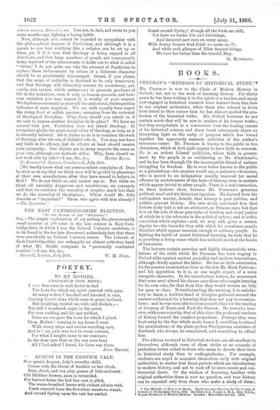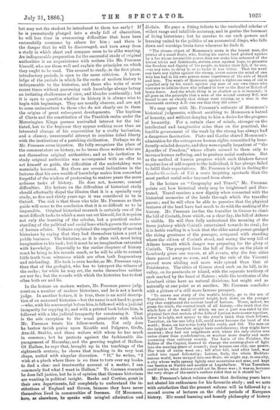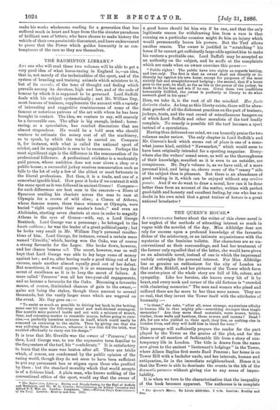BOOKS.
FREEMAN'S "METHODS OF HISTORIC AL STUDY."8 Mn. FREEMAN is new to the Chair of Modern History in Oxford; but 'not to the work of teaching history. For thirty years he has been writing it in the spirit of a teacher, and many now engaged in historical research have learned from him how to use original authorities, while those who refused to learn have found to their sorrow that he has almost spoiled the pro- fession of the historical trifler. His Oxford Lectures do not contain much that will be new to readers of his former works ; but they recapitulate in a convenient form the leading canons of his historical science, and these frank retrospects throw an interesting light on the unity of purpose which has bound together the apparently separate activities of the author's strenuous career. Mr. Freeman is known to the public in two characters, which at first sight appear to have little in common. He is an ardent Liberal politician, whose faith in govern- ment by the people is as unfaltering as Mr. Gladstone's ; and he has been through life the incorruptible friend of nations struggling for freedom. He is even better known to the public as a painstaking—his enemies would say, a pedantic—historian, who is moved to an indignation usually reserved for • moral offences by mistatements of the facts of history, even in matters which appear trivial to other people. There is a real connection, as these lectures show, between Mr. Freeman's generous political creed and his historical rigorism. He learned from his unforgotten master, Arnold, that history is past politics, and politics present history. His own study convinced him that history truly told is not an aristocrat, as Strauss says, but that it is on the side of those principles of freedom and equal justice of which he is the advocate in the political sphere; and it is this conviction which explains—and, we may add, gives a certain dignity to—the berserkir fury with which he sometimes assails blunders which appear innocent enough to ordinary people. In fighting the battle of sound historical learning, he feels that he is guarding a living cause which has suffered much at the hands of historians.
The lectures contain amusing and highly characteristic reve- lations of the strife which Mr. Freeman has been waging in Oxford alike against ancient prejadice and modern innovations, although chiefly against the latter. He has as little admiration for the present examination-fever as the late Mr. Mark Pattie= ; and his opposition to it is, as one might expect, of a more energetic character. In his introductory lecture, he announced that none need attend his classes save those who sought learning for its own sake, for that from him they would receive no help for pass or class. Notwithstanding the warning, it is satisfac- tory to learn, a faithful band of disciples gathered around the austere enthusiast for a learning that does not pay in examina- tions; and he was even able to form a small class for the reading of Gregory of Tours and Paul the Deacon. He remarks, how- ever, with some asperity, that of this class the professed teachers of history formed the smallest proportion. Perhaps they were kept away by the fear which made James I. unwilling to attend the ministrations of the plain-spoken Presbyterian ministers of Scotland, who always, he complained, said something to offend him.
The advices tendered to historical students are all excellent in themselves, although some of them strike us as counsels of perfection better suited to those who mean to devote their lives to historical study than to undergraduates. For example, students are urged to acquaint themselves early with original authorities, to master first those periods which are introductory to modern history, and not to rush off to more recent and con- troversial times. Of the wisdom of becoming familiar with original authorities there is now no question, and true history can be expected only from those who make a study of them ; • The Mefhods of Ifistnrical Study. Iftrrbt Lee' nrei Roil in the Ifo've-sity of Oxford, in Michaelmas Term, 1835. By Edward d. F:eem a:, M.A., Hon
Reales Probesm of Modern History. London : and Co. ISA
but may not the student be introduced to them too early ? If he is prematurely plunged into a study full of obscurities, he will lose time in overcoming difficulties that have been successfully overcome by others for him ; and there is the danger that he will be discouraged, and turn away from a study in which chart and compass seem to be alike wanting.
An indispensable preparation for the successful study of original authorities is an acquaintance with writers like Mr. Freeman himself, who use them well and explain the principles on which they ought to be used. The counsel to study, in the first place, introductory periods, is open to the same criticism. A know- ledge of the periods in which lie the roots of modern history is indispensable to the historian, and those who write of more recent times without possessing such knowledge always betray an irritating shallowness of view, and blunder continually ; but it is open to question whether in history it is always wise to begin with beginnings. They are usually obscure, and are apt to seem unimportant to those who do not clearly see in them the origins of great subsequent developments. The baptism of Clovis and the constitution of the Frankish realm under the Merovingian Kings possess unrivalled interest for the ini- tiated, but to the beginner they appear nothing more than an interested change of his superstition by a crafty barbarian, and a clumsy, unsuccessful attempt to combine tribal liberty with the institutions of a perishing civilisation. Perhaps we do Mr. Freeman some injustice. He fully recognises the place of the commentators on history, as he terms those writers who are not themselves original authorities ; and as his invitation to study original authorities was accompanied with an offer to act himself as guide, the difficulties of the undertaking were materially lessened. But there are several indications in the lectures that his own wealth of knowledge makes him somewhat forgetful of the wisdom of postponing to mature years the more arduous tasks of history. He does not, however, conceal difficulties. His lecture on the difficulties of historical study should effectually dispel the illusion that it is a specially easy study, as five-and-thirty years ago it was considered to be in Oxford. The risk is that those who take Mr. Freeman as their guide will come to the conclusion that it is so difficult as to be impossible. Original historical research is certainly one of the most difficult tasks to which a man can set himself, for it requires not only the learning of the scholar, but a practical under- standing of the political and social laws which govern the course of human affairs. Voltaire explained the superiority of ancient historians by saying that they had themselves taken a part is public business. The historian, as it is often said, must bring imagination to his task; but it must be an imagination saturated with knowledge. Especially to the earlier chapters of history must he bring to his records much, or he will be able to extract little truth from witnesses which are often both fragmentary and misleading. His task is even harder, as Mr. Freeman says, than that of the geologist, who has to interpret the witness of the rocks ; for while he may err, the rocks themselves neither err nor lie ; but the records with which the historian has to deal often both err and lie.
In the lecture on modern writers, Mr. Freeman passes judg- ment on a number of modern historians, and he is not a harsh judge. In another lecture, it is true, there is an acrid descrip- tion of an unnamed historian—but the name is not hard to guess —who, with his manuscript before him,is followed with a judicial incapacity for copying it ; and with a printed book before him, is followed with a like judicial incapacity for construing it. That is the sole exception to the usual generosity with which Mr. Freeman treats his fellow-workers. Not only does he bestow lavish praise upon Kemble and Palgrave, Grote, Arnold, Stubbs, and those writers with whom he has much in common ; but he protests against the fashionable dis- paragement of Macaulay, and the growing neglect of Hallam. Of Hallam, he says that, brought up in the teachings of the eighteenth century, he shows that teaching in its very best shape, united with singular discretion. "If," be writes, "I wish at a pinch where there is no time to turn over my books. to find a clear and trustworthy account of a matter, I can commonly find what I want in Hallam." To German research he does full justice, but he is of opinion that German historians are wanting in political insight. Ranke and Cortina, great in their own departments, fail completely to understand the in- stitutions of England and Greece, because they have never themselves lived in communities of freemen. Of Mommsen, Isere, as elsewhere, he speaks with mingled admiration and
disdain. He pays a fitting tribute to the unrivalled scholar of widest range and infallible accuracy, and in genius the foremost of living historians ; but he mourns to see such powers and learning united to the politics of an ecumenical Jingo, who falls down and worships brute force wherever he finds it.
"The chosen object of Mommsen's scorn is the honest man, the patriot of a small State, who, finding his native land plotted against by a foe whose irresistible power does not make him ashamed of the lowest tricks and falsehoods, strives even against hope, to preserve the freedom and dignity of his people, to hinder their fall, if he can, —at any rate, to delay it, or to make it less bitter. That the weak can have any rights against the strong, never enters the mind of one who has had in his own person some experience of the rule of blood and iron. The wrath of Mommsen against a righteous man of old is equalled only by his wrath against any man of our own times who ventures to admire those who refused to bow to the Baal or Moloch of brute force. And the whole thing is as shallow as it is immoral ; it all goes on the principle that a man of the second century B.C. was bound to see as clearly that things were coining, as a man in the nineteenth century A.D. can see that they did come."
We may agree with Mr. Freeman's estimate of Mommsen's historical judgments, without ascribing to Mommsen a hatred of honesty, and without denying to him a desire for the progress of humanity. For a certain class of minds, stronger on the intellectual and imaginative sides than on the practical, the forcible government of the weak by the strong has always had a dangerous fascination. Plato and Goethe shared Mommsen's admiration for the outrages on human rights committed by bene- ficently-minded despots, and they were equally impatient of "the Apostles of Freedom," whose efforts seemed to them only to increase human suffering, and to produce social confusion. But as the method of human progress which such thinkers favour requires loss of self-respect to the individual, it has always failed to fulfil their expectations. Mr. Freeman is right in finding the Landes-Gebteintle of Uri a more inspiring spectacle than the most perfect social order imposed from above.
In the lecture on "Geography and Travel," Mr. Freeman points out how historical study may be brightened and illus- trated. Travel receives a new dignity when connected with the historical memories of the lands through which the traveller passes ; and he will often be able to perceive that the physical features of the land have had much to do with the making of the history. Mr. Freeman invites the traveller in Greece to climb the hill of Corinth, from which, on a clear day, the hill of Athens is visible. He will then fully understand the meaning of the fierce jealousy which Corinth entertained towards its rival ; for it is feeble reading in a book that the elder naval power grudged the rising greatness of the younger, compared with standing where the citizen of Corinth stood, and seeing the very hill of Athens beneath which danger was preparing for the glory of Corinth. The prospect from the hill of Bescia on the plain of Lombardy gives one reason, at all events, why the free cities there passed away so soon, and why the rule of the Visconti proved more abiding and more wide spread than that of Peisistratos. The cities of Greece stood each on its hill, in its valley, on its peninsula or island, with the separate territory of each marked by the hand of Nature ; while the territories of the Lombard cities have no natural divisions, but might end as naturally at one point as at another. Mr. Freeman concludes with a picture of a still more famous prospect.
"To crown our study of the world's history, go to the arx of Tusculum ; from that primmval height, look down on the younger city that supplanted the ancient head of Latium. There, indeed, we grasp the truth, the central truth of all history,—the truth that the whole fate of the world of which we are a part was ruled by the physical fact that certain of the hills of Latium were nearer together, lower in height, and nearer to the river's brink than their fellows. Tusculum, on her one lofty hill, could never become the head of the world ; Rome, on her seven lowly hills could, and did. The men on the heights of Tuaculum might have confederates; they might have enemies ; they had not neighbours with whom the only choice was union closer than confederatiou, or warfare more deadly and more unceasing than ordinary enmity. The Latin of the Palatine, the Sabine of the Capitol, learned to change the meeting-place of fight into the meeting-place of council; they became one city, one power. The work of union went on ; bill after hill, land after land, was called into equal fellowship; Latium, Italy, the whole Mediter- ranean world, were merged into one State, we might say, in one city, a city whose walls sprang lightly over mountains and seas, and kept one bastion at Nisibis and another at Lugubalium. What Timonium could not be, what Athens could not be, Rome was ; it was so, because the very shape of the earth's surface ruled that so it should be."
Mr. Freeman's latest volume shows that declining years have not abated his enthusiasm for his favourite study ; and we note
with satisfaction that the present volume will be followed by a second course of lectures on the chief periods of European history. His sound learning and homely philosophy of history make his works wholesome reading for a generation that has suffered much in heart and hope from the the sinister paradoxes of brilliant men of letters, who have chosen to make history the vehicle of their own pessimistic discontent, and have endeavoured to prove that the Power which guides humanity is as con- temptuous of the race as they are themselves.




































 Previous page
Previous page